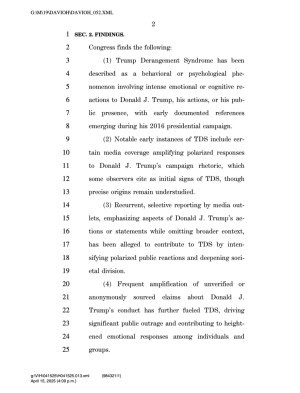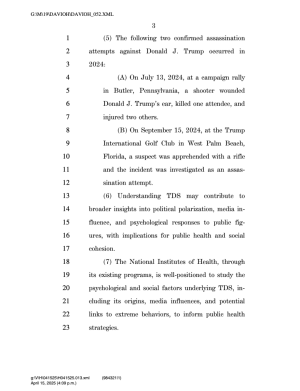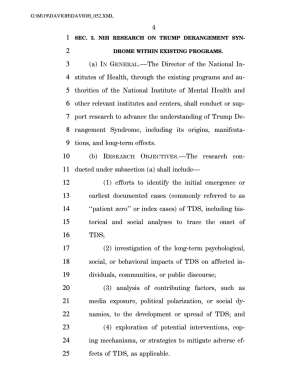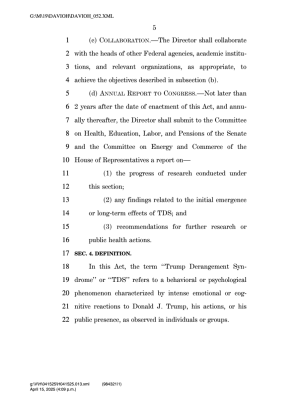Could you be suffering from “Trump derangement syndrome”? New bill aims to find out
- Replies 0
In a political era defined by strong opinions and even stronger emotions, it’s no surprise that the term “Trump Derangement Syndrome” (TDS) has become a household phrase.
But is it a real phenomenon, or just a catchy insult tossed around in heated debates?
Now, a new bill in Congress aims to get to the bottom of it—and you might be surprised by what’s at stake.
What Is “Trump Derangement Syndrome”?
First coined during Donald Trump’s presidency, “Trump Derangement Syndrome” is a term used—often pejoratively—to describe people who display intense, sometimes irrational hostility or obsession toward Donald Trump, his actions, or his supporters.
Now, his Congressional supporters are calling for research to determine whether his left-wing detractors truly suffer from what they’ve labeled “Trump Derangement Syndrome.”
Alleged symptoms of TDS include “an intense, often irrational hostility or obsession with Donald Trump, his actions, or his supporters.”
Trump’s backers often deploy the term pejoratively to dismiss his critics. It “lacks a formal psychological or medical basis” and instead rests on extreme political animus toward the 45th and 47th president.

Political adversaries—including some within his own party—have branded Trump an enemy of democracy, a fascist, and even likened him to Hitler.
He’s been so vilified that his mere presence has ignited nationwide protests, effigy burnings, and two assassination attempts.
Of course, critics argue that the term is simply a way to dismiss legitimate concerns or criticisms of the former president. But with passions running high on both sides, the question remains: is there something unique about the way some people react to Trump?
Also read: Trump teases the possibility of another political decision–"I'm not done yet."
A Congressional Push to Study TDS
Enter Rep. Warren Davidson (R-Ohio), who has introduced the “Trump Derangement Syndrome (TDS) Research Act of 2025.”
The bill calls on the National Institutes of Health (NIH) to study the psychological and social roots of TDS, its symptoms, and its long-term effects.
The goal? To understand what’s fueling the outrage, division, and even violence that have sometimes accompanied Trump’s time in the spotlight.
According to Davidson, “TDS has divided families, the country, and led to nationwide violence—including two assassination attempts on President Trump.”
The bill would reallocate existing NIH resources (so, no new taxpayer spending) to examine:
- The origins and causes of TDS
- How media coverage may contribute to the phenomenon
- The impact of TDS on families, communities, and public discourse
- Possible interventions or solutions
The act even calls for the NIH to try to identify “patient zero”—the first known case of TDS—and to report back to Congress within two years.
“Notable early instances of TDS include certain media coverage amplifying polarized responses to Donald J. Trump’s campaign rhetoric, which some observers cite as initial signs of TDS, though precise origins remain understudied,” the legislation reads.
Under its terms, the NIH must deliver a report to Congress detailing its data and conclusions within two years of the law’s enactment.
Alabama Republican Rep. Barry Moore co-sponsors the act. Whether the House will take it up remains uncertain—and proponents insist it “shouldn’t cost taxpayers a dime.”
Source: FOX 9 Minneapolis-St. Paul / Youtube.
“The TDS Research Act would require the NIH to study this toxic state of mind, so we can understand the root cause and identify solutions,” Davidson said.
According to the bill text reviewed by the Daily Mail, the legislation would fund research into TDS symptoms, origins, long-term effects, and intervention strategies.
It defines TDS as “intense, irrational emotional or cognitive reactions to President Donald J. Trump, his actions, or his public presence.”
Read next: Is your health at risk? Learn how these alarming budget cuts could affect you!

Have you noticed “Trump Derangement Syndrome” in yourself or others? Do you think it’s a real issue, or just political name-calling? How do you keep your cool when political debates get heated? Share your thoughts, experiences, and tips for staying sane in a divided world in the comments below!
But is it a real phenomenon, or just a catchy insult tossed around in heated debates?
Now, a new bill in Congress aims to get to the bottom of it—and you might be surprised by what’s at stake.
What Is “Trump Derangement Syndrome”?
First coined during Donald Trump’s presidency, “Trump Derangement Syndrome” is a term used—often pejoratively—to describe people who display intense, sometimes irrational hostility or obsession toward Donald Trump, his actions, or his supporters.
Now, his Congressional supporters are calling for research to determine whether his left-wing detractors truly suffer from what they’ve labeled “Trump Derangement Syndrome.”
Alleged symptoms of TDS include “an intense, often irrational hostility or obsession with Donald Trump, his actions, or his supporters.”
Trump’s backers often deploy the term pejoratively to dismiss his critics. It “lacks a formal psychological or medical basis” and instead rests on extreme political animus toward the 45th and 47th president.

A Republican congressman, Warren Davidson, has introduced the Trump Derangement Syndrome (TDS) Research Act, aiming to study why some people display intense and irrational hostility towards Donald Trump. Image source: FOX 9 Minneapolis-St. Paul / Youtube.
Political adversaries—including some within his own party—have branded Trump an enemy of democracy, a fascist, and even likened him to Hitler.
He’s been so vilified that his mere presence has ignited nationwide protests, effigy burnings, and two assassination attempts.
Of course, critics argue that the term is simply a way to dismiss legitimate concerns or criticisms of the former president. But with passions running high on both sides, the question remains: is there something unique about the way some people react to Trump?
Also read: Trump teases the possibility of another political decision–"I'm not done yet."
A Congressional Push to Study TDS
Enter Rep. Warren Davidson (R-Ohio), who has introduced the “Trump Derangement Syndrome (TDS) Research Act of 2025.”
The bill calls on the National Institutes of Health (NIH) to study the psychological and social roots of TDS, its symptoms, and its long-term effects.
The goal? To understand what’s fueling the outrage, division, and even violence that have sometimes accompanied Trump’s time in the spotlight.
According to Davidson, “TDS has divided families, the country, and led to nationwide violence—including two assassination attempts on President Trump.”
The bill would reallocate existing NIH resources (so, no new taxpayer spending) to examine:
- The origins and causes of TDS
- How media coverage may contribute to the phenomenon
- The impact of TDS on families, communities, and public discourse
- Possible interventions or solutions
The act even calls for the NIH to try to identify “patient zero”—the first known case of TDS—and to report back to Congress within two years.
“Notable early instances of TDS include certain media coverage amplifying polarized responses to Donald J. Trump’s campaign rhetoric, which some observers cite as initial signs of TDS, though precise origins remain understudied,” the legislation reads.
Under its terms, the NIH must deliver a report to Congress detailing its data and conclusions within two years of the law’s enactment.
Alabama Republican Rep. Barry Moore co-sponsors the act. Whether the House will take it up remains uncertain—and proponents insist it “shouldn’t cost taxpayers a dime.”
Source: FOX 9 Minneapolis-St. Paul / Youtube.
“The TDS Research Act would require the NIH to study this toxic state of mind, so we can understand the root cause and identify solutions,” Davidson said.
According to the bill text reviewed by the Daily Mail, the legislation would fund research into TDS symptoms, origins, long-term effects, and intervention strategies.
It defines TDS as “intense, irrational emotional or cognitive reactions to President Donald J. Trump, his actions, or his public presence.”
Read next: Is your health at risk? Learn how these alarming budget cuts could affect you!
Key Takeaways
- A Republican congressman, Warren Davidson, has introduced the Trump Derangement Syndrome (TDS) Research Act, aiming to study why some people display intense and irrational hostility towards Donald Trump.
- The bill would require the US National Institutes of Health to investigate the psychological and social causes of TDS and examine whether media coverage contributed to the phenomenon.
- The proposed legislation seeks to use existing NIH resources, without additional taxpayer expense, to study symptoms, origins, long-term effects, and possible interventions for TDS.
- Similar efforts have been made before, with some Republicans wanting TDS classified as an official disorder due to its alleged links to verbal hostility and acts of aggression against Trump and his supporters.
Have you noticed “Trump Derangement Syndrome” in yourself or others? Do you think it’s a real issue, or just political name-calling? How do you keep your cool when political debates get heated? Share your thoughts, experiences, and tips for staying sane in a divided world in the comments below!










